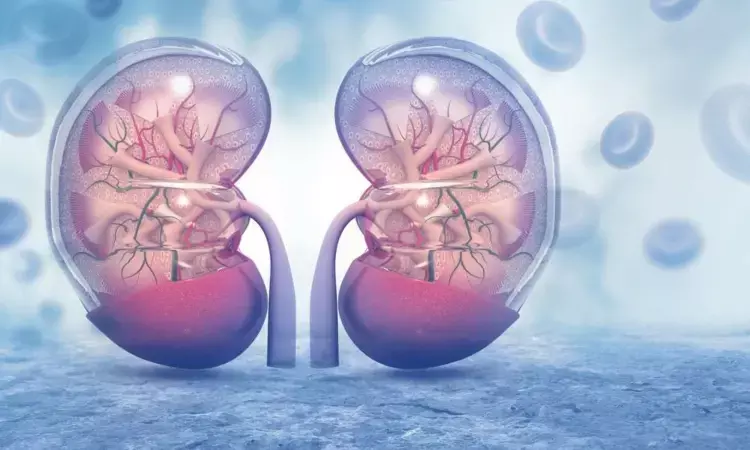- Home
- Medical news & Guidelines
- Anesthesiology
- Cardiology and CTVS
- Critical Care
- Dentistry
- Dermatology
- Diabetes and Endocrinology
- ENT
- Gastroenterology
- Medicine
- Nephrology
- Neurology
- Obstretics-Gynaecology
- Oncology
- Ophthalmology
- Orthopaedics
- Pediatrics-Neonatology
- Psychiatry
- Pulmonology
- Radiology
- Surgery
- Urology
- Laboratory Medicine
- Diet
- Nursing
- Paramedical
- Physiotherapy
- Health news
- Fact Check
- Bone Health Fact Check
- Brain Health Fact Check
- Cancer Related Fact Check
- Child Care Fact Check
- Dental and oral health fact check
- Diabetes and metabolic health fact check
- Diet and Nutrition Fact Check
- Eye and ENT Care Fact Check
- Fitness fact check
- Gut health fact check
- Heart health fact check
- Kidney health fact check
- Medical education fact check
- Men's health fact check
- Respiratory fact check
- Skin and hair care fact check
- Vaccine and Immunization fact check
- Women's health fact check
- AYUSH
- State News
- Andaman and Nicobar Islands
- Andhra Pradesh
- Arunachal Pradesh
- Assam
- Bihar
- Chandigarh
- Chattisgarh
- Dadra and Nagar Haveli
- Daman and Diu
- Delhi
- Goa
- Gujarat
- Haryana
- Himachal Pradesh
- Jammu & Kashmir
- Jharkhand
- Karnataka
- Kerala
- Ladakh
- Lakshadweep
- Madhya Pradesh
- Maharashtra
- Manipur
- Meghalaya
- Mizoram
- Nagaland
- Odisha
- Puducherry
- Punjab
- Rajasthan
- Sikkim
- Tamil Nadu
- Telangana
- Tripura
- Uttar Pradesh
- Uttrakhand
- West Bengal
- Medical Education
- Industry
Neurological dysfunction tied to ischemic injury to kidneys in type 1 diabetes patients

Canada: Neurological dysfunction in diabetes presence contributes to impaired renal blood flow and ischemic injury in patients with type 1 diabetes; however, early autonomic dysfunction does not seem to be associated with changes in kidney function, new research shows. The findings appeared in the Journal of Diabetes and its Complications.
The study was conducted by Yuliya Lytvyn, University of Toronto, Toronto, Ontario, Canada, and colleagues to determine the relationship between renal hemodynamic function and neuropathy in type 1 diabetes (T1D) adults with ≥ 50 years compared to nondiabetic controls.
For this purpose, the researchers measured effective renal plasma flow (ERPF,p-aminohippurate), glomerular filtration rate (GFR, inulin), corneal confocal microscopy, modified Toronto Clinical Neuropathy Score (mTCNS), heart rate variability (autonomic function), and nerve conduction; estimation of (RA) and efferent (RE) arteriolar resistances were done in 74 patients with T1D and 75 controls.
eGFRMDRD < 60 ml/min/1.73 m2 or 24-h urine albumin excretion >30 mg/day defined diabetic kidney disease (DKD) non-resistors. The relationships between renal function and neuropathy measures were examined after adjusting for sex, age, systolic blood pressure, HbA1c, 24-h urine albumin to creatinine ratio, and low-density lipoprotein cholesterol.
The study demonstrated the following findings:
- Higher mTCNS was associated with lower renal blood flow (β ± SE:−9.29 ± 4.20) and greater RE (β ± SE:32.97 ± 15.43) in participants with T1D but not in controls.
- DKD non-resistors had higher mTCNS and worse corneal nerve morphology measures than those without DKD.
- Renal hemodynamic parameters did not associate with autonomic nerve function.
"The findings suggest that neurological dysfunction in diabetes presence may be associated with impaired renal blood flow leading to ischemic injury in type 1 diabetes patients," the researchers wrote in their conclusion. "Early autonomic dysfunction does not seem to contribute to the neurologic dysfunction observed in this cohort of patients."
Reference:
Lytvyn Y, Albakr R, Bjornstad P, Lovblom LE, Liu H, Lovshin JA, Boulet G, Farooqi MA, Weisman A, Keenan HA, Brent MH, Paul N, Bril V, Perkins BA, Cherney DZI. Renal hemodynamic dysfunction and neuropathy in longstanding type 1 diabetes: Results from the Canadian study of longevity in type 1 diabetes. J Diabetes Complications. 2022 Sep 28;36(11):108320. doi: 10.1016/j.jdiacomp.2022.108320. Epub ahead of print. PMID: 36201892.
Dr Kamal Kant Kohli-MBBS, DTCD- a chest specialist with more than 30 years of practice and a flair for writing clinical articles, Dr Kamal Kant Kohli joined Medical Dialogues as a Chief Editor of Medical News. Besides writing articles, as an editor, he proofreads and verifies all the medical content published on Medical Dialogues including those coming from journals, studies,medical conferences,guidelines etc. Email: drkohli@medicaldialogues.in. Contact no. 011-43720751


